Search
Showing 10 of 522 results for group registration
-
Prime Minister's Scholarships for study in Asia and Latin America for 2023-24 announced
Prime Minister’s Scholarships for study in Asia and Latin America for 2023-24 announced
114 New Zealanders receive scholarships to Asia and Latin America
New Zealand’s connections with Asia and Latin America are set to receive a boost with the announcement of 114 individual recipients of the Prime Minister’s scholarships for Asia and Latin America over the next year, Acting Chief Executive for Education New Zealand Manapou ki te Ao (ENZ), Linda Sissons announced today.
The latest round will see scholarship recipients heading to destinations including Japan, Korea, Malaysia, China, India, Viet Nam, Mexico, Colombia, Brazil, and Chile for study and internship programmes. The individual scholarships follow the group scholarships awards of earlier this year which saw 14 groups of New Zealanders travelling to study in Asia and Latin America.
Scholarships have been awarded to recipients from a wide range of regions from around New Zealand, including Rotorua, Taupo, Gisborne, Hastings, Feilding, Tauranga, Auckland, Hamilton, Wellington, Palmerston North, Christchurch, Dunedin, Riwaka and Oamaru.
“The Prime Minister’s Scholarships offer a fantastic opportunity for New Zealanders to foster lifelong connections as they learn and grow their understanding of cultures and business practices across Asia and Latin America”, Acting Chief Executive for Education New Zealand, Linda Sissons said.
“The scholarships are awarded to enable recipients to undertake a range of global study opportunities, from language learning and exchange study to internships.
“Over the next year, recipients will embark on semester exchanges, medical electives, language immersion and indigenous integration programmes, internships, and research projects in areas such as architecture and healthcare engineering.
“The scholarships continue to enable a rich exchange of knowledge, ideas and culture for New Zealanders through reciprocal study opportunities and increase global understanding of the strength and quality of our education system”.
A full list of recipients of this individual round can be found here.
Additional information
Read how the Prime Minister’s Scholarships have enabled these past recipients to study abroad and have enriching, life-changing experiences:
About the Prime Minister’s Scholarships for Asia and Latin America
The Prime Minister’s Scholarship programme aims to strengthen New Zealand’s ability to engage with Asian and Latin American trading partners, improve the internationalisation of New Zealand tertiary institutions, showcase the strength and quality of New Zealand's education system and grow inter-cultural awareness and connections between New Zealand and other countries.
The scholarships offer flexible funding to support both short- and long-term programmes, including study abroad or exchange, internships, postgraduate study, and language programmes.
The Prime Minister’s Scholarships are funded by the New Zealand Government and administered by Education New Zealand Manapou ki te Ao.
The Prime Minister’s Scholarships for Asia (PMSA) were launched in 2013 and extended to Latin America (PMSLA) in 2016. To date, 4,155 scholarships have been awarded under the programme.
There are two scholarship rounds each year, and applications for the next scholarship round will be open to group applicants in March 2024. Many scholarship recipients are enrolled in tertiary institutions across New Zealand, but this is not a requirement for the scholarship. Any New Zealand citizen or permanent resident over 18 years old can apply for a scholarship.
For more information on the scholarships and the application process, visit https://scholarships.enz.govt.nz/.
For further information:
Justin Barnett | Director of Communications, Education New Zealand
justin.barnett@enz.govt.nz
+64 21 875 132Eve Abernethy | Communications Advisor, Education New Zealand
eve.abernethy@enz.govt.nz
+64 04 887 5215 -
Around the world in five
Asia
The rapid increase in educational agencies in China, up 242.48% since 2021, has fragmented the market, requiring universities to intensify their efforts in vetting agencies. Despite the challenges, this diversification could lead to improved services and lower costs for students and families.
North America
Canada will cap international student permits at 360,000 for two years, a 35% cut from 2023, with exclusions for master's and PhD students. This move aims to manage the rapid growth of international students, with a review of permit applications in 2025 and changes to post-graduation work permits.
South America
Argentine agencies saw a surge in students traveling abroad in 2022, primarily to the UK, Canada, and the USA. Language courses remained dominant, with rising interest in secondary and higher education sectors and more bookings for junior programs, indicating a recovery in group travel for young learners.
Europe
British students not being ‘squeezed out’ by overseas applicants, say universities
UK universities deny disadvantaging domestic students in favour of international applicants, highlighting that different entry requirements for foundation programs are not indicative of unfair practices. Data shows increased enrolment of UK students at Russell Group universities, with a balanced intake of international students, emphasizing the importance of global students for financial sustainability amidst fixed domestic tuition fees.Africa
Africa's job skills gap is widening due to tertiary education not aligning with economic needs, with most countries below the global average for higher education enrolment. Curriculum reforms are needed to include digital and entrepreneurial skills to address unemployment and enhance competitiveness.
-
Around the world in five
Asia
A shift towards non-recruitment based engagement with Indian schools could be key to better managing student expectations, stakeholders have suggested. Those who have done it well – particularly schools in the US – have created engagement through faculty, immersion trips, experiential learning opportunities, curriculum engagement and alumni, The PIE learned.
North America
British Columbia is Canada's westernmost province, and a leading destination for international students within Canada. On 1 March, the BC Ministry of Post-Secondary Education and Future Skills released details of how the international student cap will be applied within the province's education system.
Europe
A new paper from a group of experts, including three former universities ministers, challenges suggestions that the United Kingdom has too many international students and warns that the government is using out-of-date data to predict the number of overseas students expected to come to the UK for their higher education.
Africa
International educators need to prepare for ‘The Africa Decade’, where enrolment growth rates of African students globally are expected to hit their fastest rates over the next 10 years. Modelling suggested African students will account for one in eight international students by 2050, but visa rejections are seriously hampering efforts to enrol students from across the continent.
Oceania
International students are more open to switching destinations following recent government policy changes in three of the top destinations – Australia, Canada and the UK, with the UK most affected and the USA looking set to benefit, according to a student survey conducted by global higher education-focused agency group IDP Education.
-
Successful New Zealand – India Education Connect Initiative held in India
New Zealand – India Education Connect took place from 8 to 14 February, involving a high-level sector delegation made up of Vice Chancellors, Deputy Vice Chancellors, International Directors, academic heads, and regional recruitment staff from all eight New Zealand universities.
Led by Lisa Futschek, ENZ’s General Manager International, the delegation visited Bengaluru, Chennai, New Delhi, and Ahmedabad. During the visit, ENZ signed two Education Cooperation Arrangements (ECAs) and one Memorandum of Understanding (MoU), with the Higher Education Department, Government of Karnataka; Indian Institute of Management Ahmedabad (IIMA); and Gujarat International Finance Tech City (GIFT City) respectively. The ECAs and MoU provide a high-level umbrella arrangement for New Zealand universities to explore potential collaborations with each of the partners.
The New Zealand delegation with IIM Ahmedabad officials on 14 February.
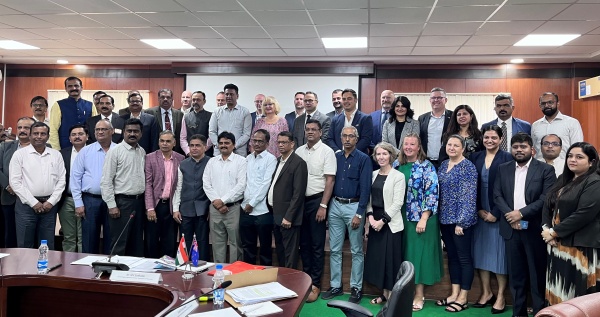
New Zealand universities delegation with Hon Dr. M C Sudhakar, Minister, Karnataka Higher Education Minister and officials of Karnataka Higher Education Council, Bengaluru on 8 February
Ms Futschek acknowledged the special relationship India and New Zealand have, noting that this year marks the 72nd anniversary of diplomatic relations between the two countries.
“India consistently holds the position of the second-largest international student market for New Zealand. The dynamic growth in the education partnerships between our two countries is attributed to strategic investments by universities, marked by heightened levels of internationalisation and strengthened commitments through the establishment of in-country representatives/offices by all eight.
“There is certainly much to be said for having power in numbers. Engaging as a group is a very good way to leverage connections with key government and private stakeholders that would otherwise be difficult on an individual institution basis,” said Ms Futschek.
The delegation visit to the New Zealand Centre at IIT Delhi (IITD) was one of the highlights of the programme as it facilitated discussions on resource mobilisation for long-term sustainability of the centre. The New Zealand Centre at IITD was established in February 2020 as a focal point for joint academic activity between New Zealand's eight universities and IITD. The centre is a research-focused hub that fosters collaborative, sustainable, self-supporting research programmes in areas of shared national interest such as climate change, disaster management, urban planning, and the environment. The first big engagement at the New Zealand Centre included 10 joint research projects between NZ universities and IITD academics in 2022. Subsequently, a fellowship programme with a joint funding of NZ$ 100,000 was announced in 2023, and as part of this programme four New Zealand Fellows will be spending time working with IITD in 2023/24 and two IITD Fellows with New Zealand universities.
Ms Futschek noted that the New Zealand Centre at IITD is a great example of how the cohesion between our eight universities and IITD has led to a flagship project growing in scale and sustainably.
“This success has all happened while building our reputation for quality education and a commitment to bilateral relations between our two countries,” added Ms Futschek.
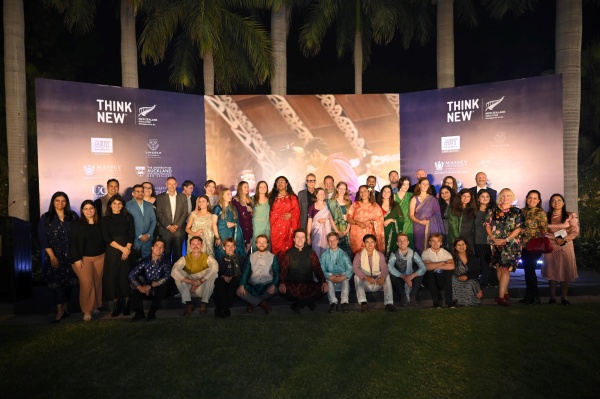
The networking reception organised by ENZ in Delhi during the ENZ Connect series, was attended by a group of 24 students from University of Auckland, University of Waikato, Massey University and Victoria University of Wellington, who were in India as part of the PMSA India immersion programme. They not only engaged with the ‘friends of NZ’ attendee, but also performed a Bollywood dance they had learnt during their six weeks in India, much to the delight of the audience.
Other activities conducted during the week included a media roundtable, led by H.E. Ambassador David Pine at the New Zealand High Commission in New Delhi. The roundtable reached over 984 million people with a PR value of over NZD 624,000, further increasing the brand awareness of New Zealand’s world class education across India.
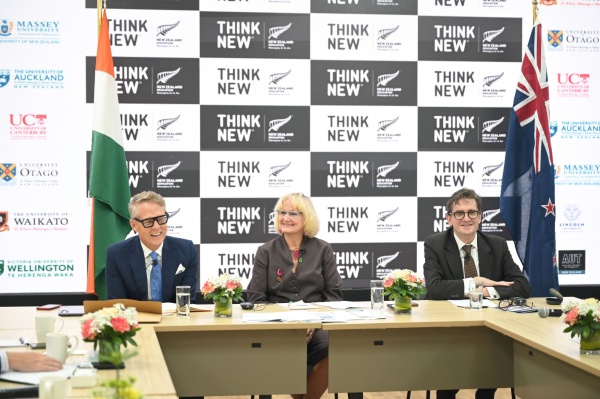
Media Roundtable at New Zealand High Commission in New Dehi, led by NZ High Commissioner to India, HE Mr David Pine, Lisa Futschek, GM International, ENZ and Brett Berquist, Assistant Vice-Chancellor Engagement University of Canterbury.
New Zealand universities also had a strong presence at QS India summit 2024, which coincided with the New Zealand – India Education Connect, helping delegates reflect their interest and achieve visibility in the Indian B2B space. ENZ was invited by QS to be a strategic partner at this summit.
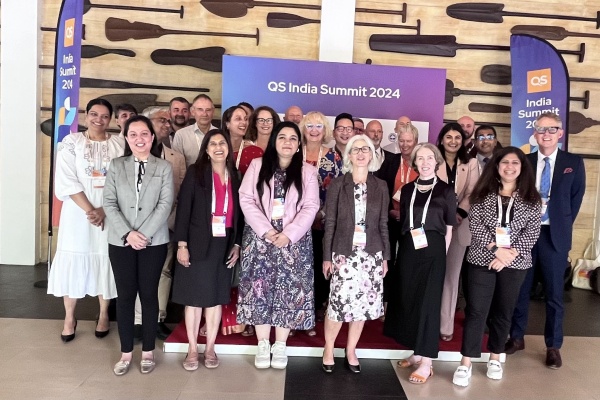
The delegation at the QS India Summit 2024.
-
Tokyo Board of Education seeks NZ education providers for Masterclass promotional opportunity
The Tokyo Metropolitan Board of Education (BoE) is one of Education New Zealand Manapou ki te Ao’s (ENZ) education cooperation arrangement partners in Japan. The BoE is currently looking for 1-2 New Zealand education providers to provide online classes for their Virtual Study Abroad session, part of the Tokyo English Channel.
These classes are designed to provide Tokyo secondary school students with the opportunity to connect with education providers from around the world, including New Zealand. During these sessions, students are exposed to new ways of thinking from lecturers while interacting and enhancing their communication skills in English with other international participants. The deadline to submit an expression of interest (EOI) is Tuesday 29 May COB NZT.
ENZ’s Senior Market Development Manager, Misa Kitaoka, said that this opportunity gives New Zealand providers a chance to promote themselves to a wide audience that includes high school students in Japan learning English as a second language as well as a larger audience of English-speaking students from Australia, Canada, Egypt, Finland, France, Indonesia, Jordan, Singapore, Thailand, Taiwan, UAE, and Viet Nam.
“This is a great opportunity for Education New Zealand and New Zealand providers to work with the Tokyo Metropolitan Board of Education to co-develop educational materials for a significant number of Japanese secondary school students. In 2023, the BoE Virtual Study Abroad pages received 840,000 views.
“Lecture videos will include promotional materials from your institution and will be publicly accessible on the BoE website after the Virtual Study Abroad Session,” said Misa.

Screenshot of the BoE website which hosted Massey University classes in 2022. The videos can be accessed via this link.
The online lectures will contain:
1. Two pre-class videos: Introduction of the lecture theme and discussion topics of approximately 5 minutes each. The pre-recorded videos will be streamed on the Virtual Study Abroad website for students to watch before participating in the actual lecture.
2. Actual lecture: Delivered online via Zoom or other video conference system on 14 October or 4 November 2024. The lecture contains:
- A two-minute school promotion (pre-recorded video)
- Lecture Part One. Presentation from the lecturer (10 minutes)
- 20 minutes of group discussion
- A 10-minute presentation by students
- Lecture Part Two. Presentation from the lecturer (10 minutes)
- 20 minutes of group discussion
- A 10-minute presentation by students
- A five-minute wrap up
The event overview and EOI requirements can be found in this document: Tokyo English Channel_Virtual Study Abroad_Lecture Themes and Event Outline.pdf.
Interested parties can submit their EOI by completing this online form: https://forms.office.com/r/U544y9CQ7D
Selection Criteria includes:
- Lecture Theme: Is the lecture theme relevant to New Zealand or the New Zealand-Japan relationship?
- Abstract: Does the abstract clearly show New Zealand’s capability or strengths in the selected topic?
- Audience: Is the lecture abstract engaging and interesting for the target audience of high school students?
The timeline for the EOI process is as follows:
Timeline:
- 31 May: ENZ submits the New Zealand finalists to Tokyo BoE
- 28 June: NZ finalists confirm the lecture title and abstract with Tokyo BoE
- 30 August: NZ finalists work with Tokyo BoE nominated vendor to record pre-lectures
- 30 August: NZ finalists provide school/institution promotion video* to Tokyo BoE
*School/institution promotion video doesn’t have to be recorded for this purpose. The school/institution can provide their existing videos e.g. already on YouTube, etc.
14 October or 4 November: Participate in online event
Examples from past event can be found via these links:
Questions about the Tokyo English Channel can be sent to ENZ’s Japan team at Japan@enz.govt.nz.
-
50 Malaysian educators experience New Zealand’s interactive early childhood education
On 9-10 May 2024, Education New Zealand Manapou ki te Ao (ENZ), the Ministry of Education Malaysia, and the University of Auckland co-hosted a two-day workshop for Malaysian educators. The theme of the workshop was "Engage, Explore, Excel: Interactive Play Strategies for Effective Preschool Education".
The workshop gave approximately 50 Malaysian preschool educators the opportunity to see and experience for themselves some of New Zealand’s innovative and interactive approaches to education that start in early childhood education facilities. The workshop was also an opportunity to strengthen bilateral ties between our two countries.
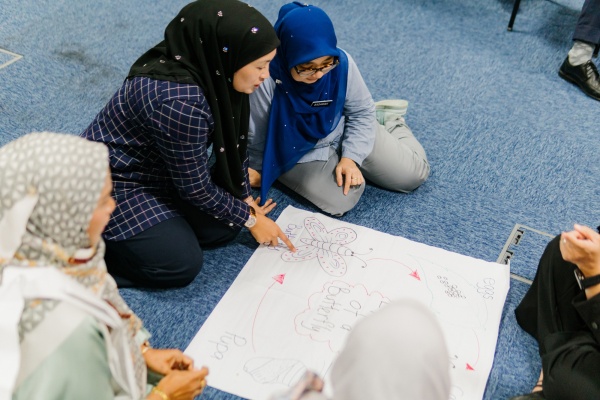
Workshop participants discussing learning techniques used in New Zealand early childhood institutions.
Professor Marek Tesar, a distinguished early childhood education expert from the University of Auckland led the workshop and shared his expertise with the group. He highlighted innovative approaches to implementing interactive outdoor play and used practical insights with theoretical foundations to enhance the educators' skills and knowledge. This included leading the group through experiential activities and thought-provoking discussions, including how outdoor play can instil a sense of environmental stewardship among teachers and children.

Malaysian early childhood educators at the workshop on "Engage, Explore, Excel: Interactive Play Strategies for Effective Preschool Education".
Ben Burrowes, ENZ’s Regional Director Asia (excluding China) and Acting General Manager International, and Emma Verry from the New Zealand High Commission in Kuala Lumpur attended the session and extended warm welcome remarks, underscoring the importance of international collaboration in advancing early childhood education in both countries.

From left to right: ENZ’s Ben Burrowes, Juraida Binti Umat Bidin, Deputy Director of Preschool Sector Curriculum Development Division and Nooraini Binti Kamaruddin, Senior Deputy Director Curriculum Development Division from the Ministry of Education Malaysia, Emma Verry from the New Zealand High Commission, ENZ’s Market Manager for Indonesia and Malaysia Naluri Bella, and University of Auckland’s Professor Marek Tesar. They are pictured here after the exchange of commemorative gifts in recognition of the occasion.
Ben said that the workshop gave a wonderful opportunity for educators from Malaysia to come together to hear from Professor Tesar and explore the multifaceted benefits of interactive play.
“Our two countries recognise the critical importance of the formative years in a child’s development and the profound impact that quality early childhood education can have on their future success and well-being.
“Participants were all very enthusiastic about discovering new ways to engage and empower their students. We hope this will lead to more collaboration and sharing of ideas between our two countries that educators and students alike can benefit from,” said Ben.
-
Neuseeland still a popular destination for German High School students
Germany takes the number one spot in all of Europe for the number of international students it sends to New Zealand and the fourth largest in the world for sending high school students after China, Japan, and South Korea. In 2023, 1,417 German students were enrolled at high schools across New Zealand which represented 10% of the total number of school students in the country.
There are positive signs that this number will continue to increase in 2024. 82 high school students were recently farewelled by the New Zealand Ambassador to Germany, Craig Hawke, and Education New Zealand Manapou ki te Ao (ENZ’s) Associate Director of Engagement in Germany, Olga Elli at an event at Frankfurt Main Airport on Sunday 14 July.
The event was organised by Study Nelson, a Nelson-based education agency, that supports German students to find a high school in New Zealand, mainly in the Nelson-Marlborough area. The event was an opportunity for the students, aged between 14 and 19, to meet and engage with each other before they embark on their international study adventure. The students will spend between three and 18 months in New Zealand, depending on their programme and some plan to complete their NCEA Level 3 university entrance here.
One particularly excited member of the group included Emely Soffel, the I AM NEW scholarship winner from 2019, who due to the pandemic, had to wait five years to make her New Zealand study abroad dream come true.
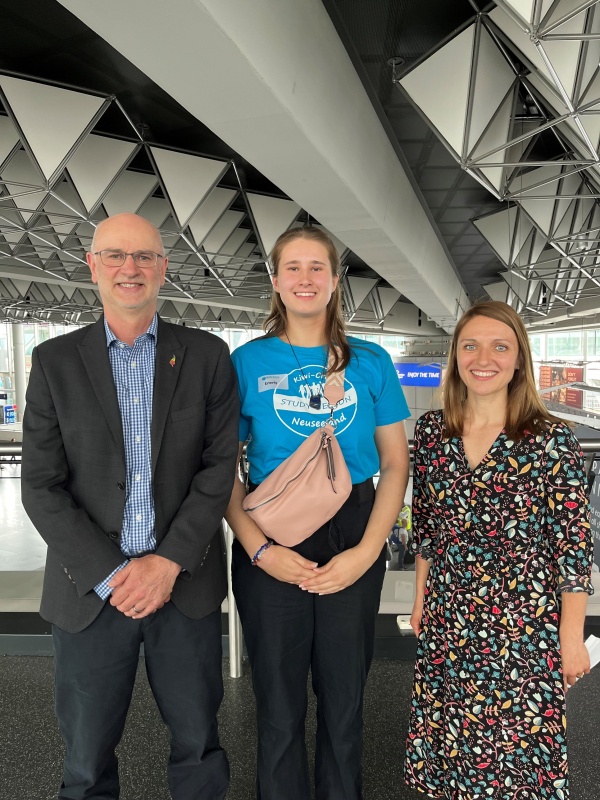
Ambassador Hawke with high school student Emely Soffel, the 2019 I AM NEW scholarship winner who was not able to travel during Covid. They are pictured here with ENZ’s Associate Director of Engagement in Germany, Olga Elli.
Olga said that Germany’s strong recovery in the high school subsector can be attributed to the experienced German agent network who have had long-standing and enduring relationships with high schools back in New Zealand.
“These agents have been building strong bridges between Germany and New Zealand for several years now, some for decades, and have made positive impacts for thousands of young people.
“They have such a deep understanding of the unique offerings that our high schools in New Zealand provide and are an invaluable service to students when trying to decide where to study,” said Olga
She added “German students love coming to New Zealand especially for the opportunity to try out subjects that aren’t typically offered at German high schools. Subjects like outdoor education, fashion design, marine biology, and food technology for example, are always really popular choices.
Ambassador Hawke mingled with the students and enjoyed hearing about their chosen schools in New Zealand. In his farewell speech to the group, he wished them a warm ‘Haere rā/farewell and said, “I invite you all to make the most of the excellent educational experience on offer in our country and also the opportunity to immerse yourself in our diverse culture. I hope you all become lifelong ambassadors for New Zealand.”
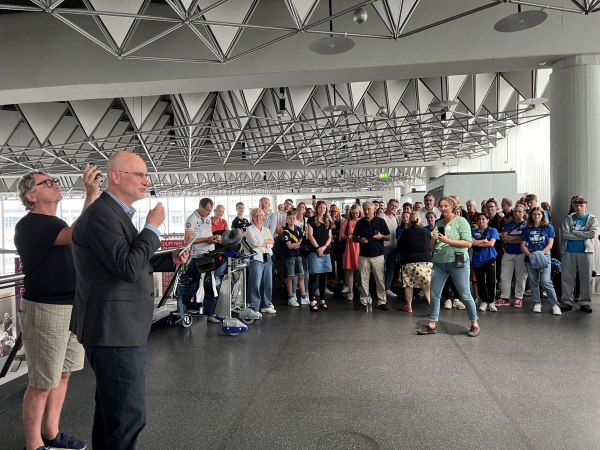
Ambassador Hawke farewells the students at Frankfurt Main Airport.
-
‘Unlock Your Future with New Zealand PTEs’ webinar series for the Indian market
According to 2023 enrolment data, India is the largest source of students for New Zealand’s Private Training Establishments (PTEs). To ensure agents in India are receiving the most up-to-date and relevant information on the quality and range of courses at New Zealand PTEs, ENZ has launched its ‘Unlock your Future with New Zealand PTEs’ series.
The series is designed to cover different programme areas offered by our PTEs. The first session, held in October, focused on Engineering, Technology, and IT programmes and proved popular with 62 education agents participating. Attending the session from the PTEs, were representatives from academyEX, Auckland Institute of Studies, Aspire2, International College of Auckland, Media Design School, New Zealand Skills and Education Group, Whitecliffe College, and Yoobee College. During the webinar, these representatives introduced their programmes, discussed pathway opportunities, job prospects after graduation, and shared alumni stories.
Ruth Cooper, Co-chair of Quality Tertiary Institutions and Country Director of Media Design School said that this series aims to give education agents a clear understanding of New Zealand PTEs.
“Indian students make up the largest group of international students at our PTEs and education agents play a crucial role in facilitating this.
“We want Indian education agents to have a clear understanding that New Zealand PTEs provide high-quality, government-recognised, and student-centred education. They are well-connected to industry and offer a wide array of courses and programs at various levels,” said Ruth.
“These webinars help providers establish and strengthen relationships with Indian education agents and equip them with valuable information to share with prospective students,” she added.
Register for the next webinar
There will be one more session held before the end of the year on Tuesday 19 November with more to follow in early 2025. The 19 November session will explore education options in food, hospitality, personal services, health, agriculture, and environmental studies. Education agents for the India market can register for this session here.
-
Support for Prime Minister’s Scholarships for Asia and Latin America recipients to continue to June 2026
The Prime Minister’s Scholarships programme was discontinued, and its funding reprioritised in the latest Government Budget 2025.
The decision to discontinue the programme is in line with the Government’s priority to deliver effective and fiscally sustainable public services and the need to focus on core activities in the current constrained fiscal environment.
The change takes effect from 1 July 2025. The decision will not impact any of the scholarships’ current recipients or recipients of the final group round, who were confirmed in June.
ENZ will continue to support current recipients, including those who are yet to travel overseas to 30 June 2026.
Since their inception in 2013 and 2016, respectively, the Prime Minister’s Scholarships for Asia and Latin America have been among ENZ’s significant, transformative and impactful programmes of work. To date, the programme has awarded 3,991 scholarships that have helped New Zealanders not only deepen their understanding of different cultures and languages but also enrich appreciation for their own culture and place in the world.
ENZ’s Group General Manager, International Marketing, Brand and Scholarships, Anna Gestro, said the Prime Minister’s Scholarships for Asia and Latin America have had a truly positive impact for building New Zealand’s connections in two key global regions.
“To date, the programme has awarded 3,991 scholarships that have helped New Zealanders deepen their understanding of new cultures and languages and enriched appreciation for their own culture and place in the world.
“The programme leaves a rich legacy through its rich and diverse alumni, who will continue to be global citizens in the way they nourish the connections and learnings picked up from their life-changing experiences from the scholarships,” Anna said.
-
Language and culture exchange strengthens ties with South Korea
The students, from 64 schools across South Korea, were welcomed by Waiuku College and St Peter’s School in Cambridge, where they connected with local students, explored school facilities, and experienced Kiwi culture first-hand. From powhiri to classroom visits, the exchange sparked meaningful cross-cultural connections.
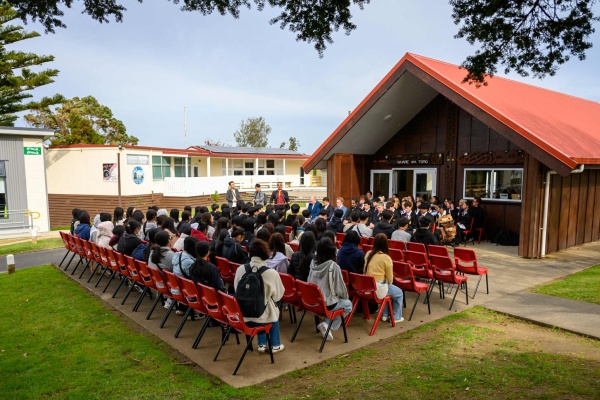
Powhiri at Waiuku College.
Waiuku College Director of Community and Global Relations, Antionette Walters, said the students were amazing, and willing to make the most of their experience.
“They were so happy to give anything a go – they even loved trying a New Zealand mince pie!” she said.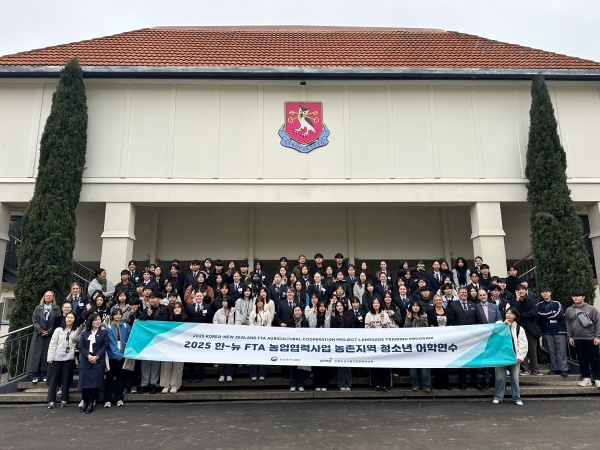
At St Peter’s, students toured the Equestrian Centre and Golf Academy, with Head of School Jason Speedy welcoming the group and sharing insights into the school’s campus and learning environment.
The visit followed a two-week English training programme in rural South Korea, where six experienced New Zealand teachers taught students aged Year 8–11. Selected from over 35 applicants, the teachers represented schools from Hamilton, Hawke’s Bay, Auckland, Cambridge, Wellington, and Tauranga.
ENZ representatives joined the programme’s opening event in Yangpyeong on 25 July, meeting the teachers and witnessing the enthusiasm of Korean students engaging with New Zealand’s distinctive teaching style.
Bernadette Moffat, ESOL Teacher at Silverdale Normal School and Huntly Primary School, said: “It was a privilege to represent New Zealand and see how eager the students were to learn.”
Bernadette was one of six New Zealand teachers who travelled to Korea to teach English and attended the closing ceremony where students were recognised for excellence in English.
Looking ahead, EPIS is exploring the possibility of expanding the current short visit into a four-week study experience in New Zealand from 2026, offering even deeper immersion for future scholarship recipients.

